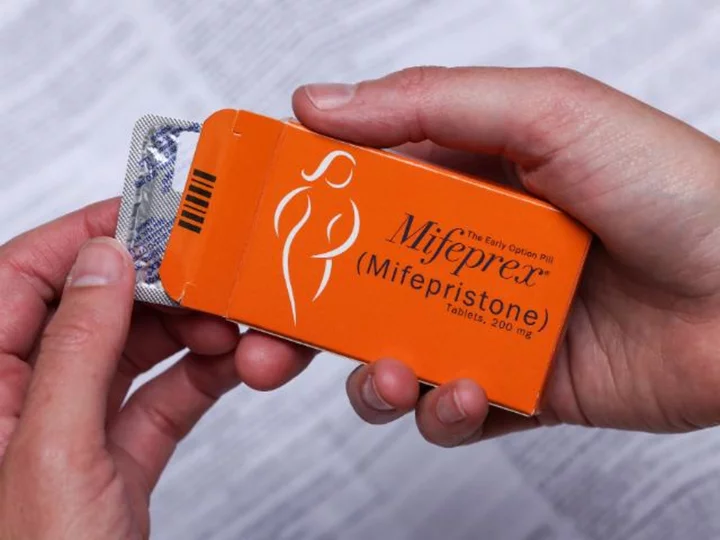An appeals court hearing Wednesday in the blockbuster abortion pill case will set the stage for how the Supreme Court will eventually approach the legal dispute, where anti-abortion activists are asking the courts to pull the main drug used in medication abortions off the market.
Their case is the most substantial legal fight over abortion since Roe v. Wade was reversed by the Supreme Court last summer. The lawsuit puts in jeopardy access nationwide to medication abortion -- the most common method of abortion in the United States -- including in states where abortion remains legal.
A panel of three judges on the New Orleans-based 5th US Circuit Court of Appeals will be the latest federal court to weigh in on the safety of the drug, mifepristone, which was approved by the federal government more than two decades ago for terminating pregnancies.
The 5th Circuit is considered one of the most conservative in the country and has consistently ruled against the Biden Justice Department.
All three judges on Wednesday's panel are Republican appointees. Circuit Judge Jennifer Walker Elrod was appointed by George W. Bush. Circuit Judges James Ho and Cory Wilson were both nominated by Donald Trump. Ho, in particular, has described abortion in inflammatory terms in judicial opinions in the past.
Wednesday's hearing -- and the lines of inquiry the extremely conservative panel of appellate judges explore -- could tee up the questions that will be at the forefront when the justices are asked again to step into the dispute.
"The Supreme Court tends to pick up big questions that are very tightly defined," Roger Severino, the vice president of domestic policy at the conservative Heritage Foundation, told CNN. "So, if, in the hearing, it turns out that there's only one or two big issues that are tightly defined, then that dramatically increases the odds that the Supreme Court will take it up."
The Biden administration and Danco Laboratories, a mifepristone manufacturer that has intervened in the case, contend that the FDA has acted appropriately in how it's regulated abortion pills and that the current medication abortion regime is exceedingly safe.
Their assertions are backed up by leading medical associations and other health experts that have filed friend-of-the-court briefs in the appeal.
Federal judges on opposite sides of the country have issued rival rulings on mifepristone this year. In the case now before the 5th Circuit, Judge Matthew Kacsmaryk in Texas said that the US Food and Drug Administration broke the law in how it approved the drug and, thus, mifepristone's approval should be suspended.
Kacsmaryk's ruling is now on pause, and the Supreme Court issued an emergency order last month maintaining the status quo around how abortion pills can be obtained. The justices' order will remain in effect until the lawsuit again heads up to the high court.
The arguments put forward by challengers -- individual doctors and medical associations that are opposed to abortion -- were embraced wholeheartedly by Kacsmaryk, another Trump nominee. They argue that mifepristone is unsafe and that its risks have been ignored by the FDA.
"The district court meticulously reviewed the science and evidence and reasonably concluded that women and girls are being harmed," the challengers said in a filing submitted to the appeals court last week. "The public does not benefit from medical innovation that disregards red flags in drug studies."
Those arguments also had some resonance with a previous 5th Circuit panel -- made up of different judges than the one presiding over Wednesday's hearing -- that have would let some of Kacsmaryk's ruling go into effect, before the Supreme Court stepped in last month. That emergency order from the justices was not a decision on the merits of the case, and only one justice, dissenter Justice Samuel Alito, wrote to explain his vote.
In addition to the Texas case, a separate lawsuit -- brought in Washington state by several Democratic attorneys general -- led to a ruling that said that mifepristone must remain available in the jurisdictions that brought the case.
"It's a battle of evidence and you have now two federal district courts in this country that have opposite opinions," said Rachel Rebouche, the dean of Temple University Beasley School of Law and a reproductive law expert.
"They have different conceptions about what is mifepristone's safety and efficacy," Rebouche added. "We should care about a decision of an appellate federal court that embraces one version of science and rejects another."
Impact on abortion access
With medication abortion making up the majority of abortions obtained in the United States, a decision that ultimately cut off or limited access to abortion pills would drastically reshape the abortion landscape in the country.
The pill's defenders note that mifepristone is used for miscarriage treatment, and argue that, even in states where abortion is mostly illegal, the impact of a ruling that pulled the drug from the market would be felt, because of health-of-the-mother exemptions and other exceptions to those bans.
Kacsmaryk's opinion, Danco told the appeals court in a brief, "fails to account for harms from forcing women into alternative ways of ending a pregnancy or into carrying an unwanted or unviable pregnancy."
"It also ignores the destabilizing harm to innovation facing the pharmaceutical industry if courts can override FDA's considered view of the scientific evidence, invent new rules for drug approvals, and throw out drug approvals based on questionable materials never presented to the agency," the company said.
Raising legal questions that could appeal to the Supreme Court
While the stakes of the lawsuit are clear, the legal claims it brings up are sprawling and convoluted.
The challengers argue that the FDA broke multiple federal laws when it approved mifepristone in 2000 and in how it's regulated the drug since, including in its moves in recent years that have made the pill easier to obtain.
One major point of tension is over a law first passed by Congress in 1873 called the Comstock Act, which criminalized the mailing of birth control, lewd materials and abortion-inducing drugs. Some in the anti-abortion movement see the Reconstruction-era law as a backdoor avenue for a de facto federal ban on abortion.
The lawyers in the mifepristone case are focused on how the law should be applied to abortion pills, arguing that the FDA unlawfully ignored the criminal statute when it approved mifepristone -- since that approval rested on drug companies' plans to ship the drug -- and when it changed the regulations more recently to let abortion pills be mailed to patients.
"This Circuit could issue an opinion that says the Comstock Act is good law. It should be applied, it should be read literally," Rebouche said, while raising the possibility that it would be interpreted to apply to the tools used for surgical abortion as well. "That in itself, to breathe life into 150-year old law that hasn't been enforced in 100 years, is pretty significant."
Another major claim in the lawsuit is that the FDA's approval of the drug should be wiped away because, the challengers argue, the regulatory mechanism that was used for its approval was aimed at "illnesses" and pregnancy is not an illness. The defendants counter that the FDA used its regulatory power appropriately in the 2000 approval and that the regulation in question also contemplates treatments for "serious or life-threatening conditions."
"Those big beefy questions of ... does an agency have the power to legalize abortion drugs when Congress didn't authorize it? Those sorts of questions are right in the Supreme Court wheelhouse," said Severino, who also served as a top civil rights lawyer in the Department of Health and Human Services during the Trump administration. "And even more so if it goes contrary to existing laws, such as in the Comstock Law."
The Justice Department, meanwhile, argues that the Comstock Act allows for the mailing of abortion drugs that are intended for lawful abortions. The government also asserts that the 1873 law has no relevance in the abortion pill lawsuit, because the FDA is not charged with enforcing the criminal statute.
But before the 5th Circuit gets to the merits of legal claims, court will have to navigate through a thicket of procedural issues that mifepristone's defenders are raising about the lawsuit.
They argue that FDA's approval of the drug is not inflicting the type of harm on the anti-abortion doctors that would justify a court's intervention. The abortion opponents are pointing to anecdotes of doctors having to care for patients who suffered medical emergencies after taking mifepristone. The challengers say the threat of anti-abortion doctors having to be implicated in those abortion-related emergencies has only increased since the FDA made the drug easier to obtain.
Kacsmaryk adopted the challengers' views on both the merits issues and the procedural questions. In doing so, he pointed to evidence in the form of anonymous blogposts solicited by a website called Abortion Changes You.
In briefs filed to the appeals court, the FDA argued that Kacsmaryk had "swept the agency's judgments aside by substituting its own lay understanding of purportedly contrary studies, offering demonstrably erroneous characterizations of the record."
"At bottom," the FDA added, "the district court's conclusions about women's interests lack merit and ignore the agency of women, who are in the best position to decide what is in their own interests in consultation with their medical providers."









